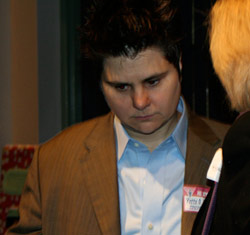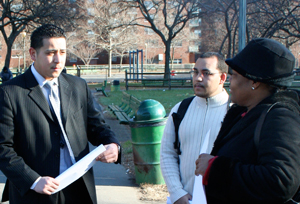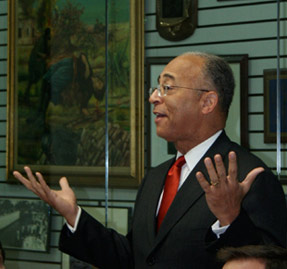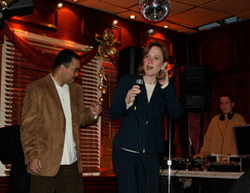 Photos by Courtney Gross
Photos by Courtney Gross
Yetta Kurland navigates a recent Democratic holiday party with ease, floating from circle to circle, distributing hugs as if they were campaign literature to attendees she has known for years.
The 40-year-old civil rights attorney is a fresh face in New York politics (some quip that she doesn't look a day over 12). To strangers, she casually introduces herself as a political newcomer, slipping in the conversation that she is a City Council candidate. Veterans of New York's political establishment, like the legendary former Assemblymember Ed Sullivan, call her a "natural." If the City Council had not extended term limits, giving two-thirds of its members a chance at another four years, she could have been a frontrunner to replace Council Speaker Christine Quinn as a representative from the third district.
Now, though, she faces seemingly insurmountable odds.
Kurland, like more than 160 other City Council candidates, said she started out her 2009 campaign thinking the incumbent would be term limited, clearing the way for a new class of legislators at City Hall. One October vote extending term limits from two to three changed all that, and now candidates across the city are scrambling to compete in far more grueling races.
To the surprise of some observers, many of the candidates have not given up. A survey by Gotham Gazette of all of the candidates who planned to run before October found at least 50 percent are sticking to their commitments and continuing their campaigns (Kurland included). Granted, some are from districts where the sitting council member is seeking higher office, but nearly half of the challengers who told Gotham Gazette they were still running will face an incumbent in September's primary.
For survey results, check out our updated version of Who's Running for What
Gotham Gazette's survey suggests the 2009 contests will be competitive, pitting old against new, setting off a familiar skirmish between experience and change.
Challengers Rise to the Challenge

Far from the speaker's district in Manhattan, insurgent, 23-year-old candidate Lynn Nunes descends 13 flights of stairs in the nation's second largest cooperative housing complex. Rochdale in Jamaica is not only where Nunes has spent a lot of time campaigning, it's also where incumbent Councilmember Thomas White lives.
At each door, on each floor, Nunes leaves a flyer -- his name and photo are on the top, and the city's most important telephone numbers, from police to nearby hospitals, are on the bottom.
At this early stage in the campaign, Nunes says he's taking a common sense approach, trying to establish some name recognition by getting his face on residents' refrigerators. When not handing out flyers, he's calling all of the district's registered Democrats on their birthdays. He will make 9,000 calls.
His likely competition, White, is completing his third term on the council, having served a full decade before being term limited out in 2001. White rejoined the council in 2006 and says he will decide this month whether to run for re-election.
Nunes plans to continue his run, regardless of White's plans.
"He represents the system, and the system is broken," said Nunes as he maneuvered through the discount-flooded shopping mall adjacent to the gargantuan housing complex. Nunes continued to hand out flyers and chat with residents, the majority of whom did not comment favorably on the incumbent.
"I think he's had his time," said Nunes.
Like other challengers in the 2009 race, Nunes plans to run on the mantra of change, calling for replacing the old guard with the new. If Jamaica is any indication, many incumbents may have it tougher than they once expected.
As of last month, 32 seats at the City Council were expected to be competitive in the 2009 races. That includes the standard opposition -- candidates who have run seven times in a row, for instance -- and races that will be neck and neck. Three of those races will be decided in a special election next month to fill the vacancies of former council members Hiram Monserrate, Michael McMahon and Joseph Addabbo, who all have been elected to higher office.
In September, the city will see dozens more contests. For example, five candidates have emerged to take on Councilmember Larry Seabrook for his Bronx seat, another three are hoping to unseat Manhattan member Miguel Martinez and two more hope to beat Brooklyn mainstay Lewis Fidler. That trend runs through much of the five boroughs.
"We need a change," said Algernon Quattlebaum, who is running for Seabrook's Bronx seat. "Our district is falling apart. I can help to bring common sense to City Hall." Quattlebaum then chuckled. "Much needed common sense."
If the council had not approved a term-limit extension, 35 members would have had to vacate their seats, leading to competitive races. In a post-term limits scenario, 14 of the 51 City Council members have currently declared for or are considering seeking higher office, leaving open seats in their districts.
Very few members, like Councilmember Peter Vallone Jr. who had his eye on the Queens borough president contest, have backed out of a race for higher office because of the term-limit extension.
In 2005, the last citywide race, only 24 races were competitive. While incumbents hold significant advantage (every incumbent who ran in 2005 in the city won except one) that apparently has not deterred scores of challengers.
The Domino Effect
The mayor, comptroller, public advocate and four out of five borough presidents were all set to leave office at the end of 2009 because of term limits. That was until Mayor Michael Bloomberg shepherded through the extension.
Now the borough presidents, with the exception of the Bronx (most likely) will try for another term. Both the comptroller and public advocate have said they will not seek re-election.
As the clear frontrunner for mayor, Bloomberg has hired a pit bull campaign steward and is planning to set a new record for campaign spending -- perhaps going as high as $100 million.

Following his change of heart on term limits, the mayor's approval rating has dipped a bit (it's still in the high 50s). But that could open a window for the candidates who still say they will run against him, Comptroller William Thompson Jr. and Rep. Anthony Weiner, who are both trying to establish themselves as the clear Democratic challenger. (Bloomberg, a Democrat turned Republican turned independent, has been cagey about any party affiliation for his re-election run.)
After much fanfare and speculation, Thompson came out last month with a new campaign site splashing "Bill Thompson for Mayor" across its home page. The move was an attempt to silence the rumors that he would back out of the race.
Thompson has held a chat with bloggers and is stepping up his criticism of the administration.
While stuffed grape leaves and steak skewers were passed around tables at a luncheon in Astoria last month, members of a local Cretan society sat down to ask Thompson questions regarding his role as comptroller. The conversation, inevitably, turned to 2009.
"It's not getting better," said Perry Mihileas, who usually goes by "Tiny." "It's getting worse -- and we need a new mayor, like Mr. Thompson." A round of applause and a smile from the comptroller met the comment.
When one attendee wondered whether Bloomberg was beatable, Thompson replied: "This really is more of a comptroller discussion. I can't do that discussion today." He paused, then said, "But yes."
Whatever he decides, Thompson's role in the 2009 campaign has the potential to create tidal waves. Many political observers believe it's too late for him to back out of the mayoral race, but if he did, it could certainly have a domino effect.
If Thompson reversed his position and decided to seek re-election, the council members vying for that post -- Melinda Katz, David Yassky and David Weprin -- might run again for their City Council seats. That move could spur the 13 candidates running for those three seats (some of the most competitive elections for a City Council seat so far) to drop out for fear of facing an incumbent.
That scenario is unlikely. Many political observers, including the candidates for Thompson's seat, believe the dust has settled on the 2009 political landscape, but, of course, anything is possible.
Campaign and City Finance
Of the remaining candidates in the city's 09 comptroller race (discounting Bronx Borough President Adolfo Carrion, who has raised nearly $2.3 million, but is unofficially heading to Washington to serve in the Obama administration) Councilmember Melinda Katz of Queens has raised the most money.
According to the Campaign Finance Board, Katz has received more than $2.1 million and spent more then $775,000. For Katz, backing away from the comptroller race, which has higher contribution limits and a much higher spending limit than a City Council bid, is a nonstarter. She has already spent nearly seven times the amount a candidate could to join the public financing system for a City Council race.
That fundraising occurred, she said, when it was "difficult" with Thompson uncommitted.

Bouncing from holiday event to holiday event last month, Katz explained what she thinks makes her the frontrunner for city comptroller. As her sports utility vehicle careened down Atlantic Avenue in Brooklyn, she highlighted her experience in the state Assembly and in the City Council as land use chair, and her tenure as a mergers and acquisitions attorney. She says confidently that she can handle the city's finances.
"Whoever is the comptroller needs to figure out how it affects everyday life," Katz said on her way to a Democratic club event on Manhattan's West Side. "We're in very hard times. We need to make sure people are working."
The decision to extend term limits had the potential to upset the city's public financing system because so many candidates seeking higher office, like Katz, were getting contributions above the council limit. Already, the entire election has seen $37.7 million raised, according to the Campaign Finance Board.
Following the term-limits extension, the board put out an advisory opinion directing 2009 candidates on how to handle the extension of term limits or a subsequent change to their campaign plans. Because most are sticking with their long-held agendas, that opinion may not have much of an impact.
"In the end, I think things are looking a lot more like the situation before term limits than anyone anticipated," said Eric Friedman of the Campaign Finance Board.
Time for a Change?
The two dozen candidates who confirmed to Gotham Gazette that they would not seek a council seat in 2009 after all, for the most part, say they are doing so out of respect and admiration for the incumbent.
Helen Rosenthal, who planned to run for Manhattan's sixth district, called the current councilmember, Gale Brewer, a "terrific person" and said she wouldn't challenge her.
"I planned to run and what I would run for is an open seat," said Rosenthal, who chairs the area's community board. "I would not run against the incumbent. That’s not what I signed up for."
Will we see Rosenthal in another four years?
"It will happen," she answered.
David Greenfield, who had eyed Councilmember Simcha Felder's seat in Brooklyn, is taking an identical position. "Simcha is a friend and a mentor, and I'm not going to run against anyone that is a friend and a mentor," he explained.
Other candidates say they are not backing down and preparing to run a far tougher and more competitive race, even though they recognize this wasn't what they had in mind.
As holiday music blared from a nearby DJ stand in the West Village, council candidate Kurland said, "My focus is to bring the voice of the community to City Hall. I think there needs to be a clear separation between the executive and legislative branches," she added.
Coincidentally, the speaker of the council -- who was circulating the same crowd at the same event -- walked right by her challenger as she explained her campaign platform. Kurland lowered her voice and said, "I have a lot of respect for Chris... I am not going to say anything bad about Chris Quinn."
The Term-Limits Landscape
The incumbents' votes on term limits could be a wild card in the upcoming campaigns. Those members who voted in favor of the extension -- in effect giving themselves a chance to hang on to their jobs -- could see their votes come back to haunt them.
Though there is not necessarily a connection between competitive races and the way a council member voted on term limits, challengers from the Bronx to Brooklyn continue to use the debate as fuel for their insurgent candidacies.
Take Alfonso Quiroz. A media manager for Con Edison, Quiroz hopes to unseat Helen Sears in Queens. Sears voted for extending term limits. "It’s a factor, obviously, because I'm going to be bringing up the extension in my race," said Quiroz. "I think it was a slap in the face to democracy."
In Brooklyn, Robert Cornegy, who plans on challenging Al Vann for his seat, said he would also use the term-limit debate to his advantage come September.
Calling the extension of term limits the "incumbent employment act," Baruch College Professor Doug Muzzio said it was not surprising that many of these candidates would use term limits as a platform in their candidacies.
"If I invested that much of my physical and physic energy and put together a campaign and fundraising, if I were doing it, I wouldn’t throw in the towel either," he retorted.
That's exactly what a lot of candidates are doing. Term limits may not have truncated the 09 race, but provided ammunition for it.
When first published, this story said every incumbent in New York City won in 2005. In fact, Allan Jennings of Queens lost to Thomas White.
